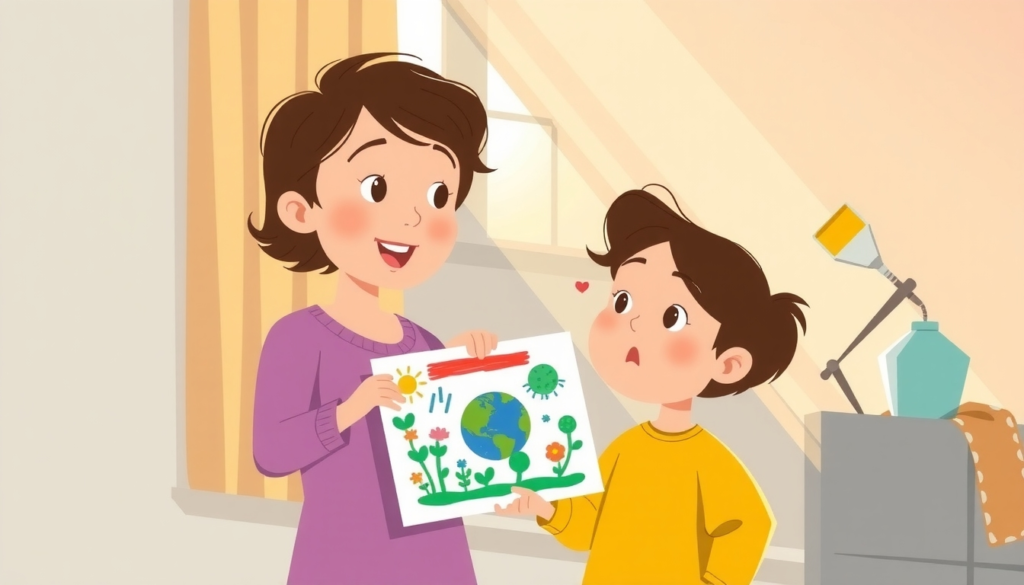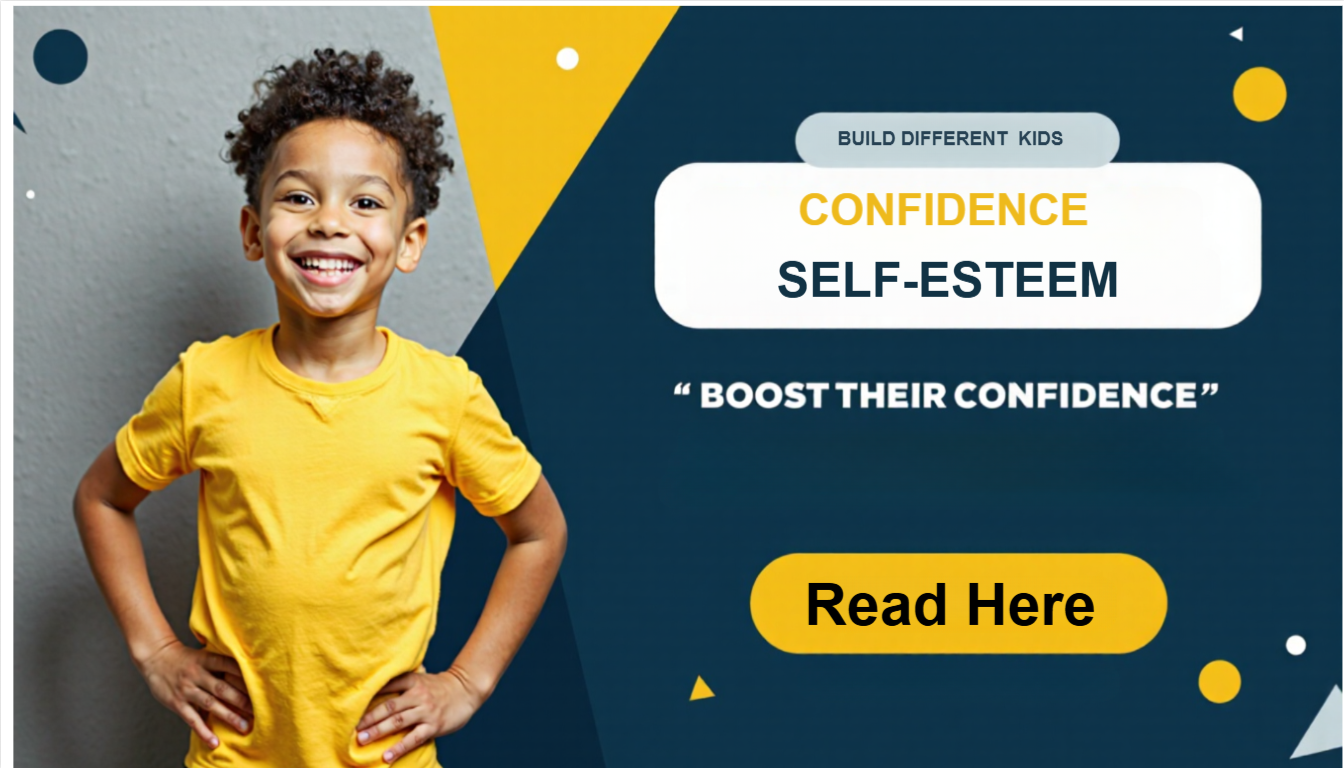Table of Contents
Building confidence in children is something every parent wants. When children feel good about themselves, they are more willing to take new challenges, learn new things and bounce back from tough situations. It is one of the best gifts we can give them for their future.
So let us understand some practical ways to help your little one feel more self-confidence every day
Understanding What Confidence Means for Children
Confidence in children is not about being the best at everything or always being perfect, It is about feeling them good about who they are knowing, handling of tough situations and having the courage to try new things even if they might fail.
Confidence in young children can be created by :
- Try new things without worrying too much about being perfect
- Speak up about their thoughts and feelings
- Keep going even when things get hard
- Think positively about themselves
- Build friendships and connect with others
Credit to : Self-Confidence ” A Short Film ”
Create a Safe Supportive Home Environment

The first step in boosting your children confidence is creating a space where they feel loved, support and safe. This doesn’t mean you have to be perfect but it does mean being there for them listening and showing that they are valued.
Here is how to do that
- Show unconditional love let them know you love them no matter what
- Listen when they talk even if it is just about something small
- Keep things predictable child is feel more confident when they know what to expect
- Let them explore and play whether it is making a mess or trying something new
- Celebrate what makes them unique whether it is their creativity or sense of humour
Children are more willing to take risks and try new things when they feel safe which builds their own confidence.
Encourage Them to Do Things on Their Own
Independence plays vital role for building self-confidence. Even small-small things make a huge difference in them when children start learning on their own and they start believing on them self.
Here is how you can help
- Allow them to choose their own dress even when the outfit does not match.
- Allow them to make simple choices like what snack they want to eat or which book to read.
- Let them solve problems on their own ,you can guide them if required but allow them to take lead.
- Teach them self-care tasks like brushing their own teeth or making their bed
Every time they do something by themselves it builds their confidence and show them that they are capable.
Best Quote:
“The most beautiful thing that you can wear is confidence. – Blake Livel“
Praise the Effort Not Just the Outcome

When children try hard at something even if they don’t succeed it is important to recognize their effort. Praising their hard work builds a growth mindset teaching them that effort leads to progress.
Instead of saying things like “You are so good at that” try –
- “I am really proud of how much effort you put into that”
- “You did not give up when it got tough that shows real determination”
- “I saw you trying different ways to solve that problem, Great job thinking it through”
When you focus on the process and effort, children learn from that.
Teach Them How to Solve Problems
Confidence grows when children can solve problems on their own. When they handle challenges even small ones it boosts their belief in their abilities.
Here is how to help them become problem-solvers
- Encourage them to figure out what the problem is even if it is something as simple as figuring out how to share toys with a friend
- Help them come up with a few ideas on how to fix it
- Talk through the pros and cons of each solution
- Let them pick the best solution and try it out
- Afterward talk about how it went and what they learned
Problem-solving is a great confidence booster because children see that they have the power to take charge of situations.
Encourage Growth Mindset
A growth mindset is the belief that abilities can grow and improve through practice and learning. When children understand that they can get better at something with effort they are more likely to face challenges with confidence.
Here is how to encourage a growth mindset
- Use positive growth-focused language for example instead of saying “You are so good at that” try to say “You worked really hard on that , look how much you have learned”
- Teach them that mistakes are part of learning do not worry if they fail, instead help them see what they can learn from it.
- Share stories of how you or others faced challenges and improved over time.
Help Them Build Social Skill

Confidence is not just about what children can do on their own it is also about how they interact with others. The more they can connect with others the more confident they will feel in social situations
Here is how to help your child with social skills
- Arrange playdates and group activities to give them practice with other children
- Role-play social situations like introducing themselves or saying “please” and “thank you”
- Teach them empathy by discussing how others might feel in different situations
- Encourage them to join clubs or teams that align with their interests
Just like any other skill socializing takes practice and the more they practice the more confident they will feel
Let Them Make Mistakes and Failures
One of the most important lessons for building confidence is teaching children that mistakes are part of life, No one gets everything right all the time.
To help them accept mistakes
- Share your own experiences with failure and ask what you learned from them
- Encourage a “try again” mindset when something does not go as planned
- Avoid harsh criticism when things don’t work out Instead focus on what can be learned from the situation
- Celebrate their efforts to try something difficult even if it did not work out perfectly
For example if they lose a game instead of focusing on winning talk about how fun it was to play and what they might do differently next time
Set Realistic Goals and Celebrate Progress
Setting small achievable goals helps children see their growth which boosts their confidence. When they hit these milestones they feel proud and ready to tackle bigger challenges
Here is how to set goals
- Start with small simple goals (e.g “Let us aim to finish this puzzle together”)
- Break bigger goals into manageable steps (e.g learning to ride a bike first with training wheels then balancing then pedalling)
- Celebrate each step along the way not just the final result
- Encourage reflection Ask them what worked and what they can do differently next time
Each accomplishment no matter how small builds their sense of self-worth
Be a Role Model of Confidence
Finally, children learn by watching you. The more confident you are in handling life challenges, the more likely they will feel confident in doing the same . Show them how it is done.
Here is how to model confidence
- Take on new challenges in front of them whether it is trying a new thing.
- Speak positively about yourself and your abilities
- Show resilience when things do not go as planned and talk about how you keep going
- Take care of yourself physically and emotionally When you model self-care they will understand how important it is.
Remember your actions speak louder than words. When they see you confidently they will be more likely to do the same.
Conclusion
Building confidence in little ones is a not a onetime activity, it is a continuous process which take time and patience. By creating a supportive environment, encouragement of independence, praising of effort, problem-solving skills, growth mindset, social skills, learning from mistakes, setting realistic goals and modelling confidence will help your child build a sense of self-confidence that will serve them the rest of their lives.
Just remember that not every child is the same and what may work for one child, may not work for another child. Therefore your consistent effort can help them success in all areas of life.

